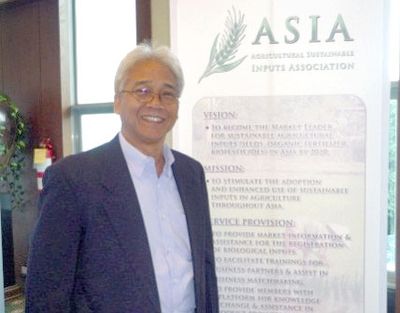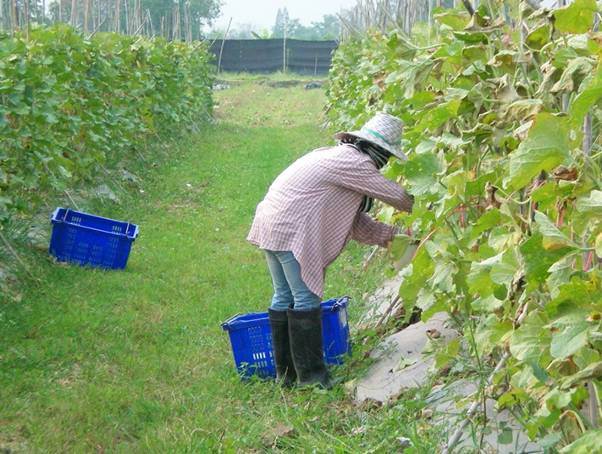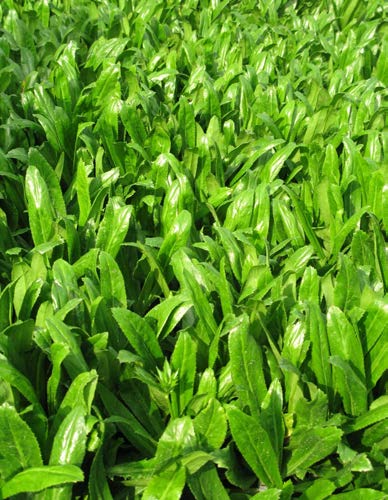Special Interview with Mr. Mukti Setiarto
Last updated: 26 November 2013 | 08:26

Mr. Mukti Setiarto is Chairman of the Bio-agro Input Association of Indonesia (ABI). He has 28 years professional experience with the Department of Agriculture of Indonesia, especially with the Offices of the Agriculture Planning Bureau, the International Cooperation Bureau and the Centre of Investment and Permit.
What is the Agricultural Sustainable Inputs Association (ASIA)?
The idea for an "Agricultural Sustainable Inputs Association (ASIA)" was established in 2008 after the regional workshop on Biopesticides Registration was conducted by GTZ (at that time) in Bali. It was agreed during the workshop that the use of bioinputs needs to receive a lot of support in many diverse areas and that its promotion should be done continuously. The Association’ s objectives are to unify and to coordinate agro input stakeholders, such as producers, distributors, academia and researchers, in order to promote and market their products; to provide services, e.g., training, information sharing, or facilitation regarding product registration; and to provide a platform for information exchange between members of the Association and relevant government authorities.
Following to the Bali workshop, producers of biocontrol agents (BCA) in Indonesia founded the " Bio-agro Input Association of Indonesia" , or in Bahasa Indonesia " Asosiasi Bio-Agro-Input Indonesia (ABI)" . We are now a key partner of the ASEAN Biocontrol Project which aims to promote the use of biocontrol inputs in our ASEAN Member States. This provides a good opportunity to extend activities from Indonesia to other ASEAN countries and to slowly establish ASIA. ABI maintains a subsidiary in Jakarta and Medan, Indonesia.
Who are your members and what kind of services do you provide to them?
 We (ABI) currently have about 10 members in Indonesia. The members are stakeholders of biological agricultural inputs for both biopesticides and organic fertilizers enhancers, as well as adapted seeds. They include producers and distributers of bioinputs as well as individuals from the private sector and government, as well as researchers, academia, farmers' organizations and non-government organizations who share the same vision; to promote the use of bio-input in Indonesia for a sustainable agriculture and the benfit of farmers. Regarding the Association’ s services, I am proud to say we have been offering services to our members in many aspects, mainly through assisting them in key areas of the regulation and promotion of the use of bio-inputs. The first means is to assist members and ensure they can get their products registered within a reasonable timeframe and cost. The latter involves enhancing a good and cooperative relationship between food exporters, producers, government agencies, service providers and other stakeholders by working together, as well as sharing market information, knowledge, and providing linkages to other stakeholders, such as farmers’ groups, cooperatives, etc.
We (ABI) currently have about 10 members in Indonesia. The members are stakeholders of biological agricultural inputs for both biopesticides and organic fertilizers enhancers, as well as adapted seeds. They include producers and distributers of bioinputs as well as individuals from the private sector and government, as well as researchers, academia, farmers' organizations and non-government organizations who share the same vision; to promote the use of bio-input in Indonesia for a sustainable agriculture and the benfit of farmers. Regarding the Association’ s services, I am proud to say we have been offering services to our members in many aspects, mainly through assisting them in key areas of the regulation and promotion of the use of bio-inputs. The first means is to assist members and ensure they can get their products registered within a reasonable timeframe and cost. The latter involves enhancing a good and cooperative relationship between food exporters, producers, government agencies, service providers and other stakeholders by working together, as well as sharing market information, knowledge, and providing linkages to other stakeholders, such as farmers’ groups, cooperatives, etc. 
Let me share with you one of most recent successful cases. ABI has put its best efforts into negotiating with government agencies to promote the use of bio-pesticides and/or 5 bio-fertilizers in government projects. For example, regarding a government project called the “ Cocoa Revitalization Programme” which was implemented in 2009-2011, we concluded successful negotiations with the government to include bio-pesticides products in 2011 operations (60 per cent of the total pest management component) and approval was recently given to extend the use of subsidized biocontrol agents in 2012 for a similar programme and also for other programmes, such as coffee, coconut, etc. So, this is an example of a good start for us. Members can promote their products through our channel and they will get recommendations from us to become involved in certain government projects, which ultimately increases their sales.
Why have you decided to extend the network to other Asian companies?
We also realized the importance of regional economic integration. If we want to go stronger, we have to take into account expansion in other ASEAN countries. Finally, we hope to see the trading community concept happening among ASEAN countries in which they not only trade their bio-control products/services, but also exchange know-how technology, research and development, as well as new initiatives etc. After having taken the decision to establish an Asian-wide membership in the " Agricultural Sustainable Inputs Association (ASIA)" , we are seeking for medium and large sized companies from ASEAN countries, India, China that are willing to become members of ASIA.
What is your main expectation of the ASEAN Biocontrol project?
Technical support and networks are very important to us. With GIZ’ s expertise in the field, we believe these areas can be developed and shared through the project.To enhance the organizational management capacity of the Association, international expertise and advice is strongly needed. We expect that within the first two years of the assignment of a German expert, who will provide organizational development services to the Association on a full time basis. These two factors will allow a significant enlargement of the number of members and at the same time, the development of much broader services for our members.
After four to five years, what would you most like to see from the Association?
In the next four to five years, we foresee that the ASIA network should exist widely, with a number of members increasing significantly from various ASEAN countries. Sales and trading exchange of bio-inputs among Asian countries should also increase significantly. Moreover, governments in Asia should have a clear common understanding of the importance to support bio-input use through good regulation and policy.